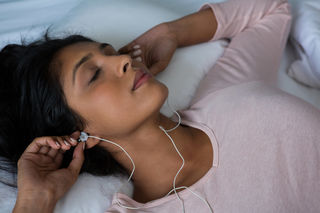Sleep
3 Intriguing Connections Between Music and Sleep
The latest insights into how music affects you at bedtime and during sleep.
Posted November 29, 2018

Babies aren’t the only ones who love lullabies. Many people of all ages use music to improve their sleep. And sleep researchers are finding growing evidence to support this approach.
Studies show that listening to or relaxing with music may be helpful even for those with short-term or long-lasting sleep disorders. For example, a recent analysis of published studies found that music offers clear benefits for primary insomnia—difficulty falling or staying asleep that isn’t due to medical problems, medications, or other substances.
Yet much remains to be learned about exactly how music affects you at bedtime and during sleep. Here are three interesting insights gleaned from recent research on the subject.
People vary widely in the type of music they fall asleep to.
Music is frequently mentioned as a pleasant way to wind down for bedtime. But surprisingly little is known about who uses this strategy and how.
In a study published earlier this month in the journal PLOS ONE, researchers in the U.K. began filling in those knowledge gaps. They conducted an online survey designed to learn more about the use of music as a sleep aid. Of more than 600 people who responded, three in five said they had ever used music to help themselves sleep. Younger people with higher musical engagement were especially likely to be in this group.
One survey question asked music users to describe what they listened to for this purpose. Clearly, people had their own ideas about the best music to snooze by. All told, music users mentioned 14 different musical genres and 545 artists.
Among genres, classical (32 percent of the total count) and rock (11 percent) topped the list, but there were a lot of variabilities. Metal (3 percent) garnered almost as many mentions as meditation music (4 percent), for example. The most-cited artists in this mixed bag were:
- Johann Sebastian Bach
- Ed Sheeran, Wolfgang Amadeus Mozart
- Brian Eno
- Coldplay, Frédéric Chopin
Many experts recommend listening to slow, predictable, lyric-free music at bedtime. But as these results show, that’s not always what people choose when left to their own devices. Perhaps that should come as no surprise. Any music you enjoy could potentially serve as a welcome distraction from stress or be part of a comforting bedtime routine.
Still, it’s likely that slow, calming music may be particularly good for eliciting certain benefits, which brings us to the next new finding …
Yoga music at bedtime may improve heart rate variability.
A study presented at the European Society of Cardiology meeting in August suggests that listening to yoga music at bedtime may be good for heart health. Yoga music is slow, soothing music that’s designed for yoga or meditation practice.
The study included more than 140 healthy individuals. On separate nights, they listened to yoga music, pop music with a steady beat, or no music before sleep. In each case, their heart rate variability (HRV) was measured before, during, and after the music or silence. HRV is a measure of how efficiently a person’s heart rate adapts to changing demands throughout the day. In people without known heart disease, low HRV is associated with about a 40 percent increased risk of having a first heart attack, stroke, or other cardiovascular events.
HRV increased during yoga music—a desirable shift. In contrast, it decreased during pop music and stayed unchanged during silence.
More research is needed to determine whether listening to calming, meditative music before sleep impacts cardiovascular health in a lasting, meaningful way. But in a statement about the study, cardiologist and lead researcher Dr. Naresh Sen notes that “listening to soothing music before bedtime is a cheap and easy way to implement therapy that cannot cause harm.”
Music may affect not only your health and your sleep but also your nighttime dreams—and that leads to yet another fascinating finding …
Dreams that include music tend to be emotionally positive.
If you don’t recall hearing music while dreaming, you’re in the majority. In a study published last summer in Psychomusicology: Music, Mind, and Brain, fewer than half of the nearly 2,000 people who responded to an online survey said they had experienced a music dream. Overall, only 6 percent of remembered dreams contained music.
The likelihood of having a music dream was higher in people who spent more of their waking time on singing, playing an instrument, or actively listening to music (i.e., listening closely and giving the music their full attention). There was also a high correlation between their preferred music style in daily life and the style of music that popped up in their dreams. The researchers say these findings support the hypothesis that the content of dreams is largely a continuation of a person’s thoughts and concerns in waking life.
Among those who had music dreams, these dreams were associated with more positive emotions than dreams in general. That may partly be due to context; music often turned up in dreams about listening to tunes and being at parties. One still-unanswered question is whether having a music dream affects someone's mood the next day.
Another provocative question is how dreams about music may stimulate creativity. From Beethoven and Stravinsky to Paul McCartney and Keith Richards, a number of notable musicians have reported hearing music and even composing new pieces in their dreams. But this ability to find musical inspiration isn’t limited to world-class musicians. In the study, more than one-fourth of those who had experienced music dreams said they had created new melodies while dreaming.
Bottom line: Whether you’re trying to get ready for bedtime, fend off insomnia, or tap into emotionally positive dreams, the results of these recent studies should be music to your ears.
References
Feng, F., Zhang, Y., Hou, J., Cai, J., Jiang, Q., Li, X., . . . Li, B. (2018). Can music improve sleep quality in adults with primary insomnia? A systematic review and network meta-analysis. International Journal of Nursing Studies, 77, 189-196. doi:10.1016/j.ijnurstu.2017.10.011
König, N., Fischer, N., Friedemann, M., Pfeiffer, T., Göritz, A. S., & Schredl, M. (2018). Music in dreams and music in waking: An online study. Psychomusicology: Music, Mind, and Brain, 28(2), 65-70. doi:10.1037/pmu0000208
Sen, N., Tanwar, S., & Jain, A. (2018). Evaluation of heart rate variability and cardiac autonomic control on exposure to Indian music and slow music yoga asana before sleep at night (abstract P4488). European Heart Journal, 39(Suppl): 908.
Trahan, T., Durrant, S. J., Müllensiefen, D., & Williamson, V. J. (2018). The music that helps people sleep and the reasons they believe it works: A mixed methods analysis of online survey reports. PLOS ONE, 13(11): e0206531. doi:10.1371/journal.pone.0206531




